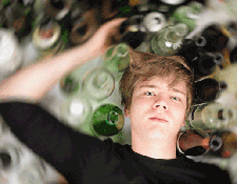Underage Drinking

The Substance Abuse and Mental Health Services Administration (SAMHSA) reports that over a quarter of the population in the United States who are under the legal drinking age are drinking anyway.
It seems that there has been progress made in decreasing the degree of underage drinking with kids aged 17 years or younger, but the rates of underage drinking remain unreasonably high. Those are a lot of big words to just say that young people are drinking before their legal age.
What they don’t know is that alcohol use has been associated with adolescent brain development and future alcohol-related problems. Research was done from a data base collected in 2008 to 2010 by the National Survey on Drug Use and Health. They found 26.6 percent of 12 to 20-year-olds said they drank in the month prior to being surveyed. 8.7 percent of these teens purchased their own alcohol when they did drink.
A SAMHSA Administrator, Pamela S. Hyde said: “Underage drinking should not be a normal part of growing up. It’s a serious and persistent public health problem that puts our young people and our communities in danger. Even though drinking is often glamorized, the truth is that underage drinking can lead to poor academic performance, sexual assault, injury, and even death.”
The report, by state, showed that underage drinking was most common in Vermont—with 37 percent—and least common in Utah at 14.3 percent. Rates of underage drinking were lowest in the southern states. SAMHSA has organized town hall meetings all over the United States to do something about underage drinking. These meetings give communities a chance to learn more about the use of alcohol among young people. Results from 2008 to 2010 inspired the town hall meetings and the resultant community involvement such as law enforcement applying policies aimed at preventing underage drinking. Sometimes rehab solutions are the best way to handle alcohol problems.
If you know someone who needs help getting off alcohol, get them to an inpatient treatment center where they can detox in a natural way. Something can be done about it!
Don’t let alcohol abuse be a problem. Contact us.